We are a leading control valve manufacturer in China, providing high-quality valves and control actuators designed to meet the specific needs of various industries.
Valves are critical to the safe and efficient operation of systems across a wide range of industries. In the demanding environment of the chemical industry, control valves play a pivotal role in regulating fluid flow within complex piping networks. Among the materials available, stainless steel has emerged as the preferred choice for manufacturing control valves, thanks to its exceptional mechanical properties and resistance to harsh operating conditions.
Why Stainless Steel?
Stainless steel is highly valued for its strength, ductility, corrosion resistance, and ability to withstand high temperatures. These attributes make it uniquely suited for chemical processing applications, where equipment is frequently exposed to aggressive media and extreme conditions. Its robustness ensures long-term durability and reliability, reducing maintenance needs and unplanned shutdowns.
Valve Selection Considerations in Chemical Applications
In chemical processing, the selection of a control valve must be approached with precision. Key factors include:
- Chemical compatibility with the process medium
- Temperature and pressure ratings suitable for both steady-state and transient conditions
- Leakage performance, especially where toxic or hazardous substances are involved
- Material integrity under corrosive or erosive service
Stainless steel valves meet these criteria, delivering consistent performance while enhancing safety and operational efficiency.
Industry Suitability and Compliance
Stainless steel control valves are especially well-suited for critical industries such as:
- Pharmaceuticals
- Food and Beverage
- Petrochemicals
- Water Treatment
Their inert and non-reactive nature ensures compliance with strict hygiene and safety standards, safeguarding product purity and process reliability. The ability to endure frequent cleaning cycles and aggressive sanitization makes them indispensable in regulated environments.
Lifecycle Value and Efficiency
Beyond initial investment, stainless steel valves offer exceptional lifecycle cost advantages:
- Low maintenance requirements
- High resistance to wear and corrosion
- Reduced downtime and extended service intervals
These benefits translate into improved operational uptime and long-term cost savings, especially in continuous or mission-critical operations.
Environmental Benefits and Market Trends
As industries shift toward sustainability, stainless steel valves are gaining popularity due to their:
- Recyclability and resource efficiency
- Minimized risk of leaks and emissions
- Support for cleaner, more efficient processes
Their long service life and minimal waste generation contribute to reducing the environmental footprint of industrial operations.
Looking Ahead: Innovation in Valve Technology
Future advancements in materials science, surface treatments, and actuation technologies will continue to elevate valve performance. Trends include:
- Enhanced corrosion and erosion resistance
- Smart valves with integrated sensors
- Precision control capabilities for advanced automation systems
These innovations will meet the evolving needs of the chemical industry while supporting digital transformation and environmental stewardship.
Conclusion
Stainless steel control valves are integral to modern chemical processing, offering unmatched durability, efficiency, and sustainability. As the industry faces growing challenges in performance, safety, and environmental compliance, these valves stand at the forefront—delivering reliable solutions today and shaping the future of flow control tomorrow.Know more about Google SEO Directory





Comments